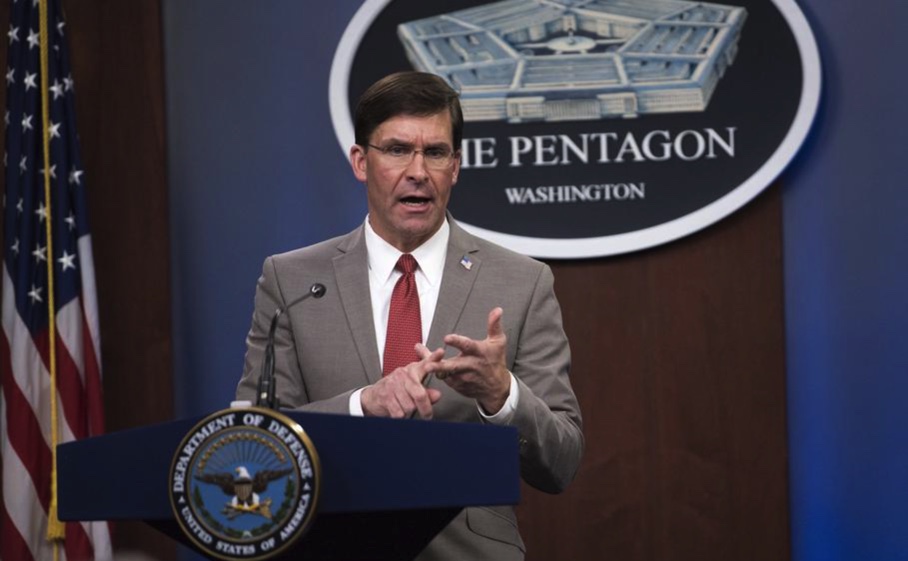
Erika Ayers Badan: You Are The Problem (And The Solution)
This is an episode for people grappling with how to manage and how to embrace AI. Good managers in the future will seamlessly balance being…
Thought Leader: Erika Ayers Badan

WASHINGTON — Former Defense Secretary Mark Esper said there’s more that the United States can do to help Ukraine defend against Russia’s invasion and standing up for democracy in Eastern Europe sends a clear message around the world that autocratic aggression will not be tolerated.
“I think [President Joe Biden’s administration] has done a good job in terms of unifying the allies,” Esper said. “To me, that was very important, because that’s what [China] was looking at: ‘Would the West stand up to Russia? And would they push back to defend this young democracy?’ If you’re able to defend a small democracy against an autocracy in their front yard — did Beijing really think they were going to [take] Taiwan a half a world away? And the answer is no.”
Esper, 58, who led the Pentagon from July 2019 to November 2020 under former President Donald Trump, expressed his opinions on the Russian war in Ukraine during a discussion Wednesday at the Center for Strategic and International Studies, a Washington-based think tank that focuses on global relations and strategy.
He said Biden has put the U.S. on the right track with Ukraine.
Biden’s administration has given close to $30 billion in military and humanitarian aid since the Russian invasion last February, including Humvees, arms, millions of rounds of ammunition, air-defense systems, armored vehicles and tanks. The U.S. announced earlier Wednesday that it would send 31 M1 Abrams tanks to Ukraine in conjunction with Germany sending some of its Leopard 2 tanks.
Esper said the American and German tanks will give Ukraine more power to drive out Russian forces. But he said he also thinks they should have been sent months ago, especially if they’re needed to repel a Russian offensive in the spring.
“It’s going to take [a number of] weeks to deliver the tanks. You have to train crews, that takes weeks,” Esper said. “I’m concerned [they are] not going to be ready in time. Rather than respond to a Russian offensive, I would rather the Ukrainians take the offensive now while the Russians are still trying to train, equip and organize their conscripts — and beat them to the punch.”
One of the things the war has revealed, he said, is Russia’s military is not as powerful as it was believed to be.
“To me, right now they’re a second-rate conventional military power with nuclear weapons,” Esper said. “Maybe a third-rate military power. So, I think we got it wrong in terms of our assessments of the Russian ability to conduct combat operations. Their equipment is failing, their generalship is weak, their soldiering, their lack of [officers], their ability to maneuver on the battlefield — you go through all the functions of war and they are just falling short. So, it’s a lesson learned for us.”
American leadership
The former defense secretary said during the discussion that another reason why the United States must be engaged in Ukraine is because the world needs leadership.
“Nobody else can lead the world but the United States,” Esper said. “We have the economic, diplomatic and military power to do this. I think a lot of countries look to us for leadership.”
“We are instrumental. If we don’t, then we create vacuums — and when you create vacuums, bad guys move into those vacuums,” he said. “There are a lot of things we should be doing” on the leadership stage, such as making strategic investments around the globe to develop assets and relationships.
“Pay now or pay more later,” Esper said.
Military recruiting
Similarly, investing in young Americans, he said, is important in solving the Pentagon’s recruiting difficulties.
Recent Pentagon data shows less than 25% of all Americans between the ages of 17 and 24 qualify physically and academically for military service. Esper said that results in about 350,000 Americans in that age range who meet the military’s requirements.
“And basically, [the military] has to scoop up half of that group in order to meet their recruiting numbers. That’s not sustainable,” he said. “Out of a nation with 34 million young people, we should have a lot more qualified kids.”
The Army, for example, missed its recruiting target by several thousand in 2022 after twice having to lower its enlistment goal.
“At some point five, eight, 10, 15 years from now, what happens when you no longer have qualified young people? What do you do?” Esper asked. “You either lower the standards, which is not a good thing, or you keep the standards high, which means you have to man the force with fewer people. That’s a national security concern of mine, and it’s something I think needs to be addressed now before we get to the crisis stage.”
Afghanistan withdrawal
Esper used the words “abysmal” and “tragic” to describe the U.S. withdrawal from Afghanistan in 2021, and he said Biden probably should have left a few thousand troops there to make certain the Taliban stuck to a peace deal brokered by the Trump administration in 2020.
“It wasn’t a great agreement, but it was a good enough agreement,” Esper said. “The Taliban had to live up to their end of the deal, they had to do certain things. And they were not doing that.”
Esper said Trump had wanted a full withdrawal of U.S. forces even sooner, by the end of 2020. But the defense secretary and his top advisers pushed back by recommending the U.S. leave a small force in Afghanistan to keep the Taliban honest, he said.
“That likely contributed to my firing, I don’t know,” Esper said. “But that was my view — you pause until they live up to the end of the deal. And if you have to, you take the fight back to them.”
Serving under Trump
Trump fired Esper in November 2020 just days after Biden became the projected winner of the election. Christopher Miller was the acting defense secretary for the final 72 days of Trump’s term.
Esper said he was ultimately disappointed with Trump as president, particularly for his response to the mass protests that followed the death of George Floyd in 2020.
He said he remembered a meeting in the White House during that time when Trump made an unusual suggestion to control crowds of protesters in Washington. During the meeting, Esper said Trump had called for “tough action” to put down the protests, which he thought made him look weak. It’s a scene that Esper described in more detail in his 2022 book, “A Sacred Oath: Memoirs of a Secretary of Defense During Extraordinary Times.”
“[Trump] says, ‘Can’t we just shoot them in the legs or something?” Esper recalled. “Needless to say, we were all taken aback.”
“We serve the American people … We don’t shoot them,” he said. “To me, it was a very low moment to be there in the Oval Office and hear the commander in chief say that.”
Erika Ayers Badan: You Are The Problem (And The Solution)
This is an episode for people grappling with how to manage and how to embrace AI. Good managers in the future will seamlessly balance being…
Thought Leader: Erika Ayers Badan
Patrick McGee: Tesla’s Robotaxi Bait and Switch
Elon Musk called self-driving cars a ‘solved problem’ 10 years ago. So how come he’s still working on it? In a new column, Patrick McGee…
Thought Leader: Patrick McGee
Mike Pence on U.S. Leadership and Global Strategy
Former Vice President of the United States, Mike Pence, shares his thoughts about President Trump’s framework on trying to acquire Greenland, and discusses what he…
Thought Leader: Mike Pence

